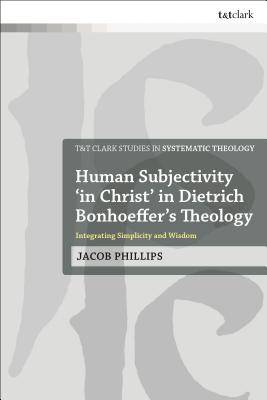
- Afhalen na 1 uur in een winkel met voorraad
- Gratis thuislevering in België vanaf € 30
- Ruim aanbod met 7 miljoen producten
- Afhalen na 1 uur in een winkel met voorraad
- Gratis thuislevering in België vanaf € 30
- Ruim aanbod met 7 miljoen producten
Zoeken
Human Subjectivity 'in Christ' in Dietrich Bonhoeffer's Theology
Integrating Simplicity and Wisdom
Jacob Phillips
€ 271,45
+ 542 punten
Omschrijving
Jacob Phillips presents a critical study of a neglected aspect of Dietrich Bonhoeffer's theology: his writing on human subjectivity, self-reflection, and individual identity 'in Christ'. In response to the rise of chronic self-representation through digital technology, Phillips argues that Bonhoeffer presents a radical challenge, maintaining that - from the perspective of Christian theology - there is something deeply negative about beholding representations of oneself. Bonhoeffer instead holds that discipleship means adopting a posture of radical agnosticism toward one's own identity.
Phillips focuses on the interrelation of 'simplicity' and 'reflection' in theological cognition and ethical deliberation, showing a wider significance in contemporary theological anthropology, soteriology and ethics. By following the tradition of reading Bonhoeffer in relation to the philosophical sources, such as Wüstenberg, Janz, Whitson-Floyd, Marsh, Zimmermann, Gregor, Phillips highlights the ways in which Bonhoeffer's work relates to modern debates in epistemology and ethics generally, and that of Wilhelm Dilthey and hermeneutical phenomenology in particular. This volume offers a detailed theological analysis of the themes of self-identity, human subjectivity, and self-understanding, which are highly pertinent for contemporary society.Specificaties
Betrokkenen
- Auteur(s):
- Uitgeverij:
Inhoud
- Aantal bladzijden:
- 224
- Taal:
- Engels
- Reeks:
Eigenschappen
- Productcode (EAN):
- 9780567688606
- Verschijningsdatum:
- 19/09/2019
- Uitvoering:
- Hardcover
- Formaat:
- Genaaid
- Afmetingen:
- 152 mm x 236 mm
- Gewicht:
- 476 g

Alleen bij Standaard Boekhandel
+ 542 punten op je klantenkaart van Standaard Boekhandel
Beoordelingen
We publiceren alleen reviews die voldoen aan de voorwaarden voor reviews. Bekijk onze voorwaarden voor reviews.








